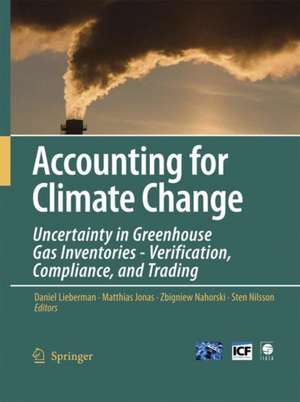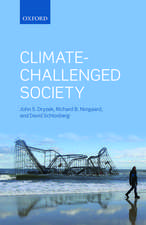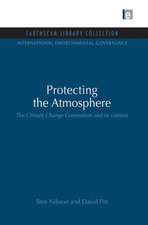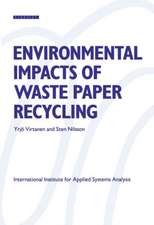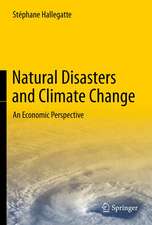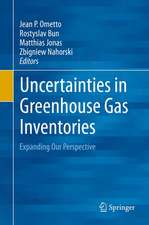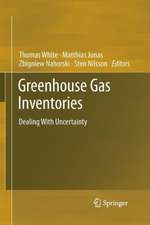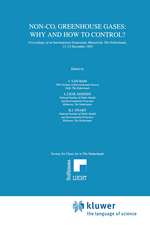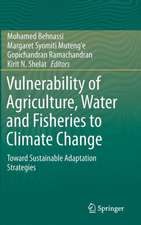Accounting for Climate Change: Uncertainty in Greenhouse Gas Inventories - Verification, Compliance, and Trading
Editat de Daniel Lieberman, Matthias Jonas, Zbigniew Nahorski, Sten Nilssonen Limba Engleză Hardback – 20 aug 2007
| Toate formatele și edițiile | Preț | Express |
|---|---|---|
| Paperback (1) | 640.37 lei 6-8 săpt. | |
| SPRINGER NETHERLANDS – 19 oct 2010 | 640.37 lei 6-8 săpt. | |
| Hardback (1) | 571.84 lei 38-44 zile | |
| SPRINGER NETHERLANDS – 20 aug 2007 | 571.84 lei 38-44 zile |
Preț: 571.84 lei
Preț vechi: 714.80 lei
-20% Nou
Puncte Express: 858
Preț estimativ în valută:
109.42€ • 114.48$ • 90.90£
109.42€ • 114.48$ • 90.90£
Carte tipărită la comandă
Livrare economică 29 martie-04 aprilie
Preluare comenzi: 021 569.72.76
Specificații
ISBN-13: 9781402059292
ISBN-10: 1402059299
Pagini: 168
Ilustrații: VI, 160 p.
Dimensiuni: 193 x 260 x 15 mm
Greutate: 0.6 kg
Ediția:2007
Editura: SPRINGER NETHERLANDS
Colecția Springer
Locul publicării:Dordrecht, Netherlands
ISBN-10: 1402059299
Pagini: 168
Ilustrații: VI, 160 p.
Dimensiuni: 193 x 260 x 15 mm
Greutate: 0.6 kg
Ediția:2007
Editura: SPRINGER NETHERLANDS
Colecția Springer
Locul publicării:Dordrecht, Netherlands
Public țintă
ResearchCuprins
Accounting for Climate Change: Introduction.- Uncertainties of a Regional Terrestrial Biota Full Carbon Account: A Systems Analysis.- National Greenhouse Gas Inventories: Understanding Uncertainties versus Potential for Improving Reliability.- Practical Policy Applications of Uncertainty Analysis for National Greenhouse Gas Inventories.- Modeling Afforestation and the Underlying Uncertainties.- Spatial GHG Inventory: Analysis of Uncertainty Sources. A Case Study for Ukraine.- Prior to Economic Treatment of Emissions and Their Uncertainties Under the Kyoto Protocol: Scientific Uncertainties That Must Be Kept in Mind.- Processing National CO2 Inventory Emissions Data and their Total Uncertainty Estimates.- Extension of EU Emissions Trading Scheme to Other Sectors and Gases: Consequences for Uncertainty of Total Tradable Amount.- Compliance and Emissions Trading under the Kyoto Protocol: Rules for Uncertain Inventories.- The Impact of Uncertainty on Banking Behavior: Evidence from the US Sulfur Dioxide Emissions Allowance Trading Program.- Tradable Permit Systems: Considering Uncertainty in Emission Estimates.
Textul de pe ultima copertă
The assessment of greenhouse gases (GHGs) emitted to and removed from the atmosphere is high on both political and scientific agendas internationally. As increasing international concern and cooperation aim at policy-oriented solutions to the climate change problem, several issues have begun to arise regarding verification and compliance under both proposed and legislated schemes meant to reduce the human-induced global climate impact. The approaches to addressing uncertainty discussed in this volume attempt to improve national inventories or to provide a basis for the standardization of inventory estimates to enable comparison of emissions and emission changes across countries. Several authors use detailed uncertainty analyses to enforce the current structure of the emissions trading system while others attempt to internalize high levels of uncertainty by tailoring the emissions trading market rules. In all approaches, uncertainty analysis is regarded as a key component of national GHG inventory analyses.
Topics of interest include:
-national greenhouse gas emission inventories
-bottom-up versus top-down emission analyses
-signal detection and analysis techniques
-verification and compliance issues
-role of uncertainty in emissions trading schemes
-compliance and emissions trading under the Kyoto Protocol
Assessment of uncertainty can help improve inventories and manage risk. Through recognizing the importance of identifying and quantifying uncertainties, great strides can be made in the process of Accounting for Climate Change.
Topics of interest include:
-national greenhouse gas emission inventories
-bottom-up versus top-down emission analyses
-signal detection and analysis techniques
-verification and compliance issues
-role of uncertainty in emissions trading schemes
-compliance and emissions trading under the Kyoto Protocol
Assessment of uncertainty can help improve inventories and manage risk. Through recognizing the importance of identifying and quantifying uncertainties, great strides can be made in the process of Accounting for Climate Change.
Caracteristici
Addresses key uncertainty issues - verification, compliance and emissions trading Presents state-of-the-art research and developments Provides a multidisciplinary forum for international experts Can be used in various courses in environmental management and environmental economics
